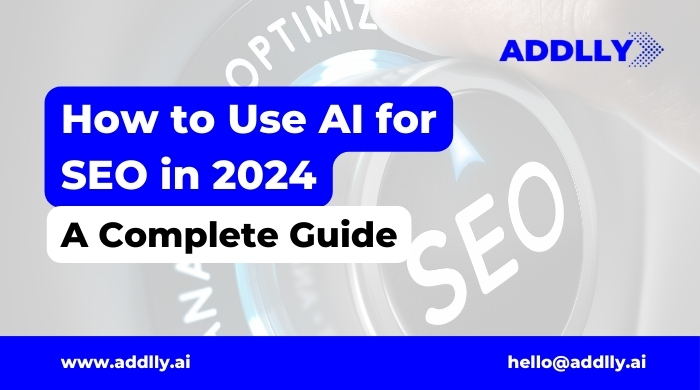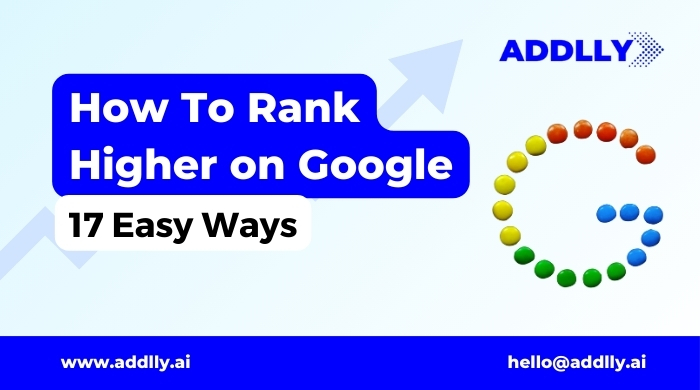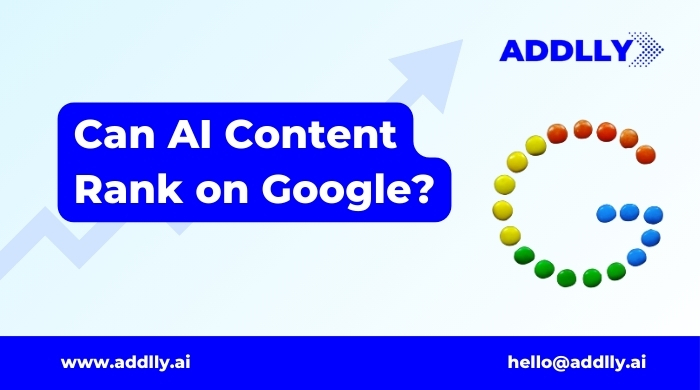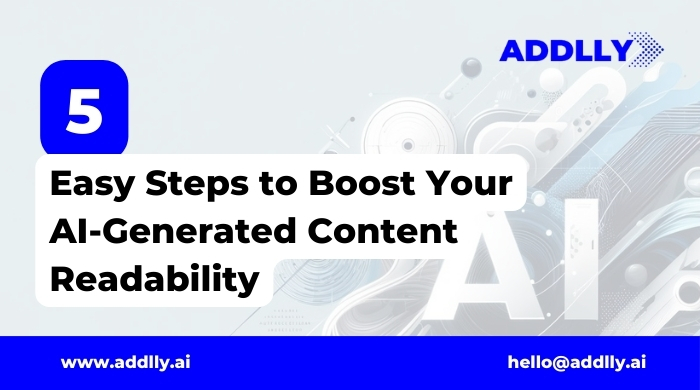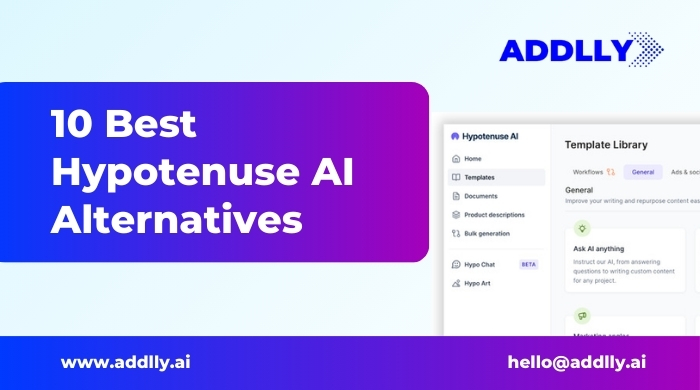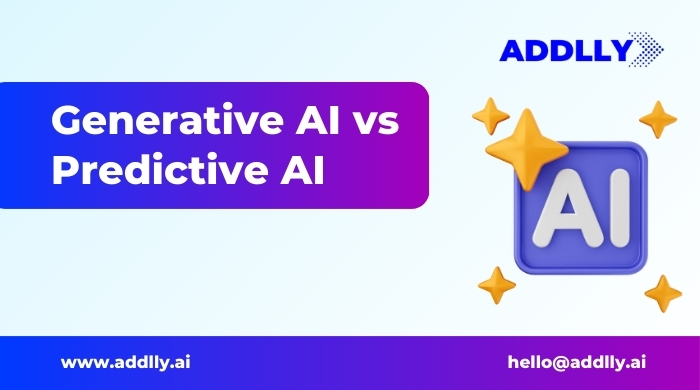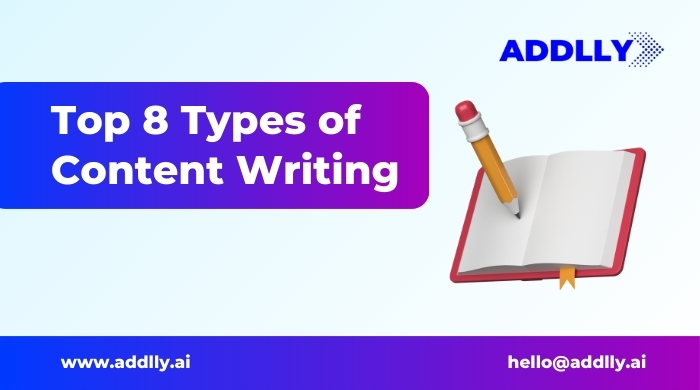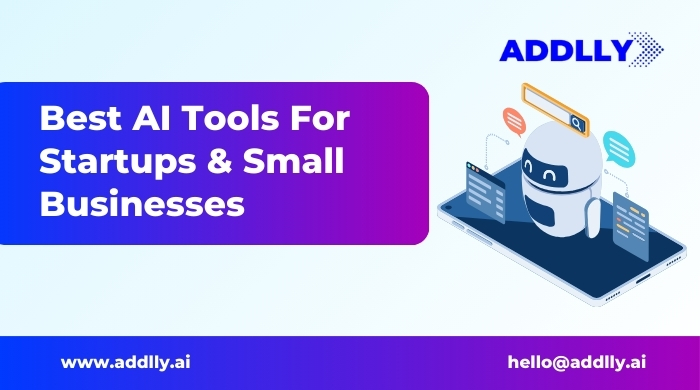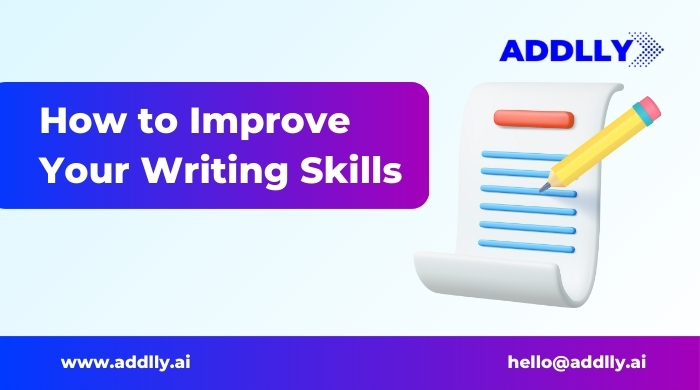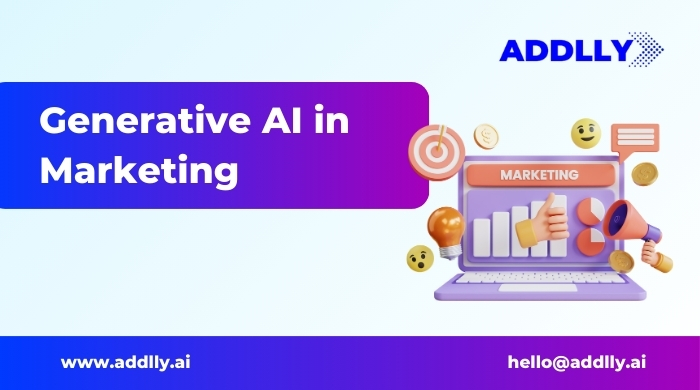In the digital age, leveraging artificial intelligence (AI) has become a game-changer. This guide is your ultimate roadmap to harnessing the power of AI for SEO in 2024, offering actionable insights and strategies to elevate your online visibility and engagement.
From exploring the best AI tools to understanding how to effectively integrate AI into your SEO strategy, we’ll dive deep into the latest trends, practical tips, and expert advice to help you stay ahead in the digital world.
Here are the key steps on how to use AI for SEO:
- Identify Where AI Can Help: Determine tasks like keyword research, content gap analysis, or user behavior monitoring that can benefit from AI.
- Select AI SEO Tools: Choose AI-powered SEO tools specializing in content.
- Focus on Content Topics: Select topics or keywords related to your industry, products, or services, using AI for content ideas or reoptimizing old content.
- Analyze Topics with AI: Use AI to analyze content topics for keyword discovery, keyword research accuracy, and SEO strategy performance improvement.
- Review AI SEO Data: After analysis, review AI-provided data on keyword targeting, SEO optimization, and content performance predictions.
- Write Content with AI: Use AI insights to write content, ensuring a human touch for accuracy and creativity.
- Optimize Content with AI: Improve underperforming content by identifying keywords or title tags for better search rankings with AI.
- Monitor and Adjust: Monitor AI-driven SEO strategies’ performance and adjust as needed.
- Stay Informed and Educated: Understand AI language, improve prompt engineering skills, and stay updated on SEO and AI trends.
To further enhance your SEO strategy with AI, let’s delve into the top AI tools available for each specific use case.
AI Tools for Keyword and Topic Research

Keyword research is a fundamental aspect of search engine optimization and content marketing strategies. By identifying the right keywords to target, businesses can create content that resonates with their target audience and improves their online visibility.
How AI Helps in Keyword and Topic Research
AI tools analyze search data to identify keywords that are relevant to your business or industry, have high search volumes, and are less competitive. This helps in creating content that is more likely to rank well in search engine results pages (SERPs).
Beyond keywords, AI tools also assist in identifying broader topics that are trending or have high search volumes. This helps in creating content that not only targets specific keywords but also engages users on a broader level.
AI tools can also perform competitive analysis by identifying the keywords and topics that your competitors are targeting. This information can be used to refine your own keyword and topic strategy to stay ahead of the competition.
Best AI Tools for Keyword and Topic Research
AI-based keyword research tools like Addlly, Semrush, Ahrefs, and Moz use machine learning algorithms to analyze search data, user behavior, and online content. These tools can suggest relevant keywords, analyze search volumes, and assess the competition for each keyword, helping you identify lucrative opportunities for your content.
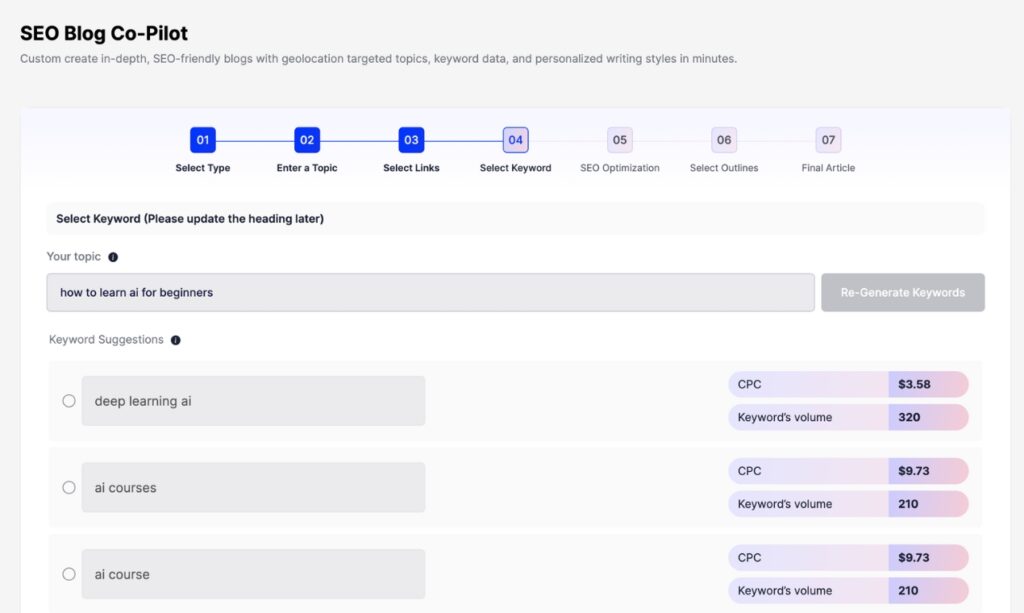
Addlly AI’s tools include a 1-Click Blog Writer for creating SEO-friendly blogs, a SEO Blog Copilot for generating detailed content including keyword research and repurposing old content, a Social Media Post Generator for crafting viral posts with real-time trends, and an Ad Copy Writer for developing effective Google Ad copy with CPC data. These tools collectively contribute to a comprehensive keyword research solution by automating and enhancing various aspects of content creation and SEO optimization.
AI Tools for Learning About Your Audience

AI tools that can learn data about your audience are powerful technologies that allow you to gain valuable insights into your target customers or users. These tools leverage machine learning and natural language processing techniques to analyze various data sources and extract meaningful patterns and trends.
How AI Helps in Learning About Your Audience
The process typically involves data collection from sources like website analytics, social media, customer surveys, and feedback forms. This data, which can include demographic information, behavior patterns, interests, preferences, and sentiments, is then preprocessed and cleaned to ensure quality and consistency.
Advanced machine learning algorithms are applied to the processed data, enabling the tools to identify patterns, correlations, and insights that would be difficult for humans to detect manually. By analyzing the data, these AI tools can make predictions about future behavior, preferences, and trends within your audience.
Many of these tools have the capability to continuously learn and adapt as new data becomes available, providing updated insights and improving the accuracy of their predictions over time.
Best AI Tools for Learning About Your Audience
Some of the best AI tools for learning about your audience include Google Analytics, Salesforce Einstein Analytics, IBM Watson Studio, Adobe Analytics Cloud, Clarifai (for computer vision and image recognition), MonkeyLearn (for text analytics and sentiment analysis), and Prevedere (for forecasting and predictive analytics).
When choosing an AI tool, consider factors such as the size and complexity of your data, the specific insights you need, integration with your existing tools and systems, and the scalability and flexibility of the solution.
AI Tools for Schema Markup
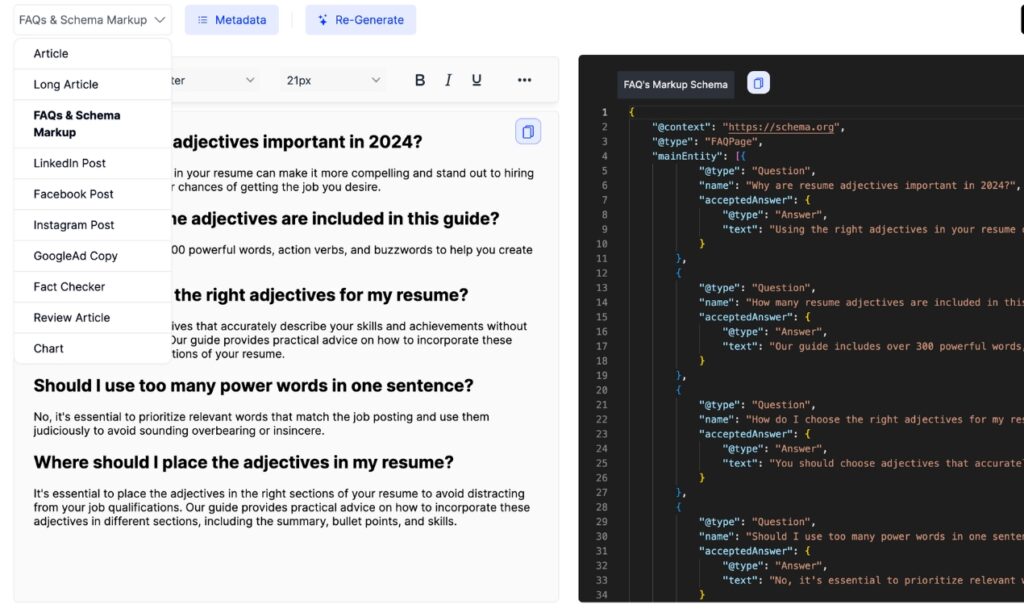
What is Schema Markup
Schema markup is a form of structured data that can be added to web content to communicate information more effectively with search engines. This structured data helps search engines understand the content of a webpage better, leading to richer search results and potentially higher rankings in search engine results pages (SERPs).
Types of Schema Markup
FAQ Schema
This type of schema is used to structure frequently asked questions and their answers on a webpage. It helps search engines understand the content of FAQ sections, making it easier for users to find answers to their questions directly on the webpage.
Article Schema
This schema is used for articles, blog posts, and other types of content that provide information to the reader. It helps search engines understand the content of the article, including its headline, author, publication date, and more. This can lead to richer search results, such as article snippets in SERPs.
Addlly AI: Best AI Tool for FAQ Schema Markup
Addlly AI is an example of an AI tool that can generate FAQ schema markup. Based on the AI-generated content, Addlly AI processes the information and generates Schema.org FAQ schema markup code in 1 click.
After generating the FAQ schema markup code with Addlly AI, the next step is to add this code to the relevant pages on your website. This can be done by inserting the code into the HTML body of your web pages, typically using a HTML code block or widget.
It’s important to validate the schema markup code to ensure it’s free of errors or warnings. Tools like Google’s Rich Results Test can be used for this purpose, helping to identify and correct any issues before the schema markup is implemented.
AI Tools for Content Optimization

What Is Content Optimization
Content optimization refers to the process of improving your website’s content to make it more appealing to search engines, thereby enhancing its visibility and ranking in search results.
This involves optimizing various aspects of your content, such as keyword usage, readability, and relevance to search queries, to ensure it aligns with search engine guidelines like E-E-A-T (experience, expertise, authoritativeness, and trustworthiness).
How AI Tools for Content Optimization Work
AI tools for content optimization typically follow a few key steps:
- Content Analysis: The tool scans the content to understand its current state. This includes identifying the main topics, the tone of the writing, and any SEO keywords that are already in use.
- Optimization Suggestions: Based on the analysis, the tool suggests improvements. This could involve rewriting sentences for clarity, adding or removing keywords for better SEO, or adjusting the structure of the content to improve readability.
- Content Generation: Some tools can also generate new content based on the analysis. This could be new articles, blog posts, or social media posts that are tailored to the content’s audience and goals.
- Performance Tracking: After the content has been published, the tool tracks its performance. This includes metrics like page views, bounce rate, and conversion rates. The tool uses this data to further refine its suggestions and improve future content.
Best AI Tools for Content Optimization
There are several AI tools available for content optimization, each with its own strengths and features. Here are a few notable ones:
- Addlly.ai: Addlly.ai is a comprehensive content optimization tool that uses AI to analyze and rewrite content for better SEO, readability, and engagement. It offers features like keyword optimization, content rewriting, and performance tracking. Addlly.ai is particularly known for its ability to generate high-quality content that is tailored to specific audiences and goals.
- Yoast SEO: While primarily known as a WordPress SEO plugin, Yoast SEO also offers content optimization features. It can analyze your content for SEO issues and suggest improvements. Yoast SEO is a great choice for WordPress users looking to optimize their content for search engines.
- CoSchedule: CoSchedule is a content calendar and SEO tool that helps marketers plan, create, and promote content. It offers features like content optimization, keyword research, and social media scheduling. CoSchedule is particularly useful for marketers looking to manage their content strategy across multiple platforms.
AI Tools for On-Page SEO
On-page SEO is crucial for ensuring that your website is optimized for search engines and provides a positive user experience.
Website Crawling and Auditing with AI
AI-powered website crawlers and auditing tools, such as Botify, DeepCrawl, and Screaming Frog, can analyze your website’s structure, content, and technical aspects. These tools use machine learning algorithms to identify issues like broken links, duplicate content, missing alt tags, and other on-page SEO problems that can negatively impact your search engine rankings and user experience.
Content Structure Optimization with AI
AI-based content optimization tools like Addlly, Clearscope, MarketMuse, and Frase can analyze your content and provide recommendations for improving its structure, hierarchy, and organization. These tools use natural language processing (NLP) and machine learning to understand the relationships between topics, subtopics, and keywords, ensuring that your content is logically structured and easy to navigate for both users and search engines.
Internal Linking Optimization with AI
Proper internal linking is crucial for improving crawlability and distributing link equity throughout your website. AI tools like Link Whisper and Link Assistant can analyze your content and suggest relevant internal linking opportunities, helping to create a more cohesive and well-connected website structure.
Site Architecture and Navigation Optimization with AI
AI-powered tools like Botify and Deepcrawl can analyze your website’s architecture and navigation, identifying issues that may hinder search engine crawlers or create a poor user experience. These tools can provide recommendations for optimizing your site’s structure, such as improving URL structures, creating hierarchical category pages, and streamlining navigation menus.
Image Optimization with AI
AI-based image optimization tools like Cloudinary, Imgix can analyze and optimize your website’s images for better performance and SEO. These tools can automatically resize, compress, and convert image formats, reducing file sizes while maintaining high quality. They can also generate alt text and other metadata using computer vision and NLP techniques.
Page Speed Optimization with AI
Page speed is a critical factor for both user experience and search engine rankings. AI-powered tools like Google PageSpeed Insights and WebPageTest can analyze your website’s performance and provide recommendations for optimizing page load times. These tools can identify bottlenecks, suggest code optimizations, and recommend techniques for reducing server response times and render-blocking resources.
Addlly AI: A Comprehensive On-Page SEO Solution
Addlly AI is a powerful AI-driven content optimization tool that combines various AI techniques to help you create high-quality, engaging content:
- Fact-Check Feature: Addlly AI’s fact-check feature uses advanced natural language processing and machine learning models to verify the accuracy of information in your content. It cross-references your content against authoritative sources and provides suggestions for correcting any inaccuracies, ensuring that your content is factually sound and trustworthy.
- FAQ Schema Generator: Addlly AI can automatically generate FAQ schema markup for your content, making it easier for search engines to understand and display your content in rich snippets and answer boxes. This feature can improve your content’s visibility and click-through rates in search results.
AI Tools for SERP Analysis

What is SERP Analysis
SERP analysis involves studying the quality of pages that appear at the top of a search engine results page (SERP). It helps SEO professionals understand the opportunities and challenges associated with targeting specific keywords. This analysis can reveal whether a keyword is too competitive or presents a good opportunity for ranking.
How AI Tools Work in SERP Analysis and SEO
AI SEO tools use complex algorithms to analyze data and provide insights into various aspects of SEO, such as keyword research, competitor analysis, and content optimization. They can uncover link-building and high-ranking keyword opportunities, aiding in crafting effective content strategies. AI tools also assist in content creation, aligning with Google’s E.A.T requirements, optimizing content for voice search, enhancing user experience, and predicting trends.
Best AI Tools for SERP Analysis and SEO
When choosing an AI tool for SEO, consider the tool’s pricing structure, user reviews, case studies, customization options, and whether it offers a trial period or demo. Tools like Addlly AI, Semrush, Surfer SEO, ChatGPT are highly recommended due to their comprehensive features, advanced AI capabilities, and ability to simplify the SEO workflow.
AI Tools for Identifying High-Performing Content

Creating high-performing content is a key element of a successful SEO strategy. With the power of AI, you can leverage data-driven insights to identify what content resonates with your audience and optimize your content creation efforts. Here’s how you can use AI to assist in identifying high-performing content.
Content Analysis and Recommendations
AI-powered tools can analyze your existing content and provide recommendations for improvement. With NLP algorithms, AI can understand the context, structure, and sentiment of your content. It can then suggest changes to optimize readability, improve keyword usage, and enhance the overall quality of your content.
Topic Generation and Content Ideas
AI can assist in generating topic ideas based on popular and trending keywords, user search queries social media posts, and competitor analysis. By analyzing vast amounts of data, AI-powered tools can identify content gaps and provide you with a wealth of ideas to create valuable and engaging content. This can help you stay ahead of the curve and provide fresh, relevant content that attracts organic traffic.
Performance Analytics
AI tools can provide comprehensive performance analytics for your content. By analyzing metrics such as page views, time on page, bounce rates, and conversions, AI can help you understand which content is resonating with your audience. This data-driven approach optimize content also allows you to identify high-performing content and replicate its success in future content creation efforts.
Content Optimization for Voice Search
As voice search continues to rise in popularity, AI-powered tools can assist in optimizing your content for voice queries. With the help of NLP algorithms, these tools can understand conversational language and help you create content that aligns with voice search queries. By adapting your content to this emerging trend, you can increase your chances of appearing in voice search results.
Predictive Content Analysis
AI can predict the potential success of your content based on historical data and trends. By analyzing factors such as keyword competitiveness, user engagement patterns, and social media trends, AI can provide insights into the performance of your content before it is even published. This allows you to make data-driven decisions and focus your efforts on creating high-performing content.
AI Tools for Optimizing Website Structure and Navigation

The structure and navigation of your website play a crucial role in providing a seamless user experience and improving your SEO performance. This is yet another area where AI can help, by optimizing your website’s structure and navigation to enhance user engagement and search engine rankings.
Site Structure Analysis
AI-powered tools can analyze your website’s structure and provide insights into its organization and hierarchy. By examining factors such as URL structure, internal linking, and page categorization, AI can detect areas for improvement. An optimized site structure helps search engines understand your content better and improves user navigation throughout your website.
Content Organization and Taxonomy
AI can assist in organizing and categorizing your website’s content, as AI can understand the context and relationships between different pieces of content. This allows AI-powered tools to suggest optimal content organization, helping users find relevant information more easily and improving search engine crawling and indexing.
Internal Linking Optimization
AI-powered tools can analyze your website’s internal linking structure to ensure it is optimized for both users and search engines. AI can analyze the relationship between different pages, evaluate the relevance of anchor texts, and suggest improvements. A well-structured internal linking strategy enhances the accessibility and discoverability of your content, leading to better user engagement and SEO performance.
User Behavior Analysis
AI can analyze user behavior patterns, such as click-through rates, bounce rates, and time spent on page, to gain insights into how users interact with your website. By understanding user behavior, AI-powered tools can suggest improvements to the website’s navigation and user interface. This helps create a more intuitive and user-friendly experience, increasing user satisfaction and reducing bounce rates.
Mobile Optimization
AI can assist in optimizing your website for mobile devices, which is crucial for providing a seamless user experience. AI-powered tools can analyze your website’s responsiveness, page load times, and overall mobile performance. The insights gained ai tool can help you identify areas for improvement and ensure your website is optimized for mobile users, who make up a significant portion of online traffic.
Addlly AI: A Comprehensive SEO and AI Content Writing Tool
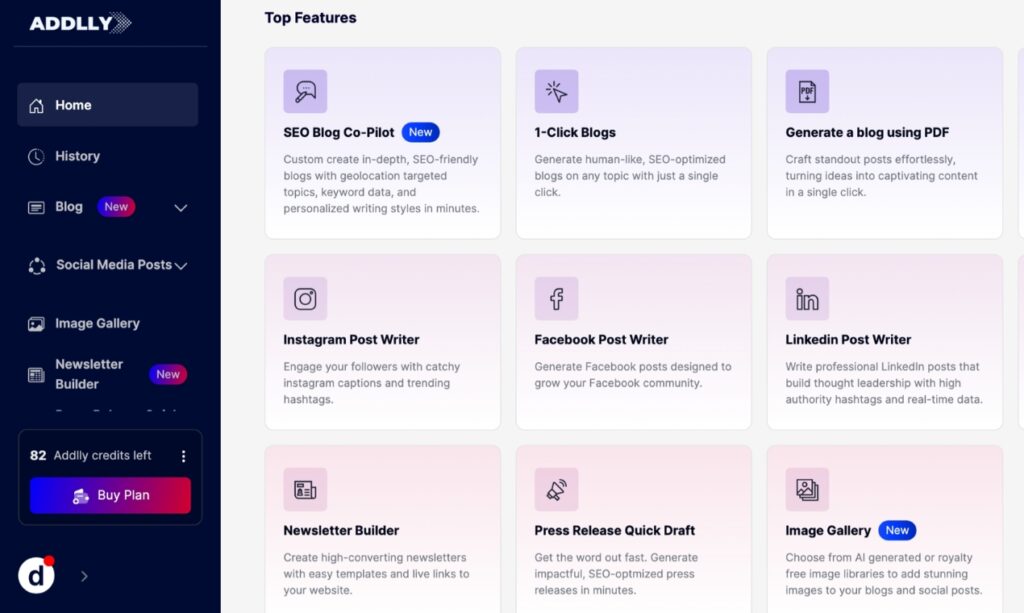
Addlly AI is a comprehensive suite of AI-powered tools designed to streamline and enhance various aspects of your SEO and content creation process. Our toolset includes:
- 1-Click Blog Writer: Simply provide the subject and a target keyword, and let Addlly take care of the rest. It will produce a blog post that aligns seamlessly with search engine algorithms, in mere minutes with just one-click.
- SEO Blog Copilot: Provide the keyword, location, and competition keyword. This feature grants users total control over the output from start to finish, while ensuring optimized content. It provides source citations so you can be assured of non-plagiarised, unique content.
- AI Social Media Post Generator: Input the main keyword for the post, and Addlly seamlessly manages the rest, including top hashtags and suggested images, ensuring your social content is optimized for search engines. It can also produce a social media post based on the blog you’ve just created, ensuring a seamless workflow.
- AI Image Generation: Obtain unique, high-quality AI-generated images that are relevant to your blog or social copy.
- Google Ads Copy: Simply provide the keyword you wish to rank for and some competitor keywords. Addlly will craft compelling Google Ads copy that aligns perfectly with search engine algorithms.
Addlly AI stands out by focusing on SEO optimization, maintaining your brand’s unique voice, providing real-time data, and utilizing multiple AI models to deliver the best results. It addresses common frustrations with generic AI content by using cutting-edge AI models, ensuring that your content is not only SEO-optimized but also resonates with your brand’s voice and stays relevant with the latest trends.
This tool is particularly useful for businesses looking to automate and enhance their content creation and SEO efforts, offering a comprehensive solution that covers blog writing, social media content, and ad copy creation. With Addlly AI, you can stay ahead of the competition by leveraging AI to create high-quality, brand-focused marketing content in seconds.
Conclusion
Now that we’ve explored how to use AI for SEO, it’s clear that it can be a game-changer in improving your website’s search engine optimization efforts. AI-powered tools can automate data analysis, uncover valuable insights, and provide recommendations to enhance various aspects of your SEO strategy.
AI helps you gain a competitive edge by understanding user intent, optimizing your content for voice search, and staying updated on the latest trends. AI also helps you identify high-performing content, enhance your website’s structure and navigation, and develop user-focused content strategies.
Don’t miss out on the opportunities AI presents for SEO. Embrace the power of AI, stay informed about the latest advancements, and continuously refine your SEO efforts. By keeping up with the ever-evolving digital landscape and leveraging AI for SEO, you can stay ahead of the competition and achieve long-term success in the digital world.
Recommend reads:
Author
-

As the Content Marketing Specialist at Addlly.ai, I specialize in writing compelling articles and creating visually engaging designs and videos for our marketing materials. My role encompasses developing informative and captivating content that resonates with our audience, alongside designing dynamic visuals that enhance our brand's message.
